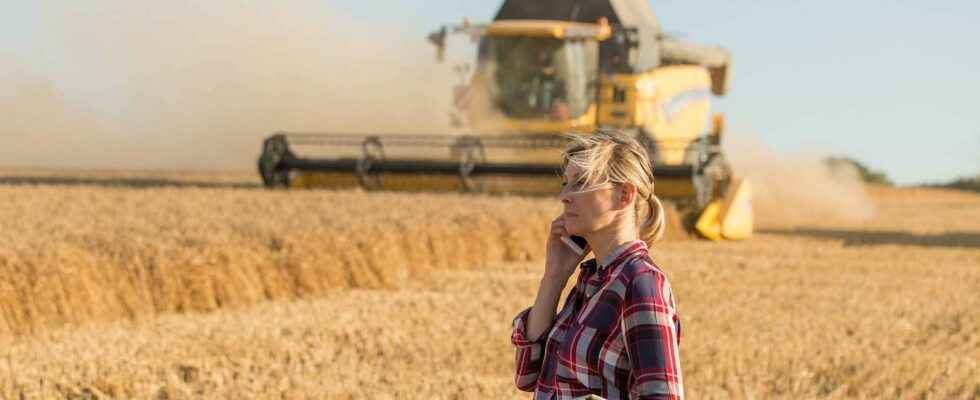You will also be interested
[EN VIDÉO] Our agriculture will soon be affected by global warming Some of the effects of global warming are already being felt. Others are yet to come. The yields of certain crops could thus drop tangibly from 2030 under the effect of rising temperatures, variations in precipitation patterns and high levels of carbon dioxide (CO2) in the atmosphere. This is the conclusion of researchers who have worked on the most efficient climate and crop models of the moment. Maize yields, for example, could drop sharply. (in English) © NASA Goddard
Bérengère Chombart is the daughter of a farmer and, for seven years, a farmer herself. However, she went through other paths before making this return to her roots. Before her professional retraining in the agricultural world, she did indeed complete five years of study after her baccalaureate, in a business school in Lille. She then worked for fifteen years in a company during which she dealt with management control, audit, marketing, communication and project management. It was in 2015 that she decided to take over the family farm on the outskirts of Lille after obtaining an agricultural diploma through distance learning. This desire for retraining, she explains it by several reasons.
Bérengère wanted to be her own boss
The first is that Bérengère wanted to be her own boss and run her business. The second is that this reconversion is encouraged by the evolution of the agricultural world and particularly by theemergence new technologies that provide significant support to farmers.
Tractors, for example, are now equipped with GPS. Decision Support Tools and weather stations make it possible to improve agricultural practices and better manage activities in the fields according to sometimes capricious climatic conditions. The third reason is a mixture of history, transmission, tradition and envy.
An ongoing learning
Bérengère manages a medium-sized farm on the outskirts of the city of Lille. Because of this localization, it undergoes the pressure land with the development of urbanization. His farm covers 65 hectares, on which he grows wheatsugar beets, But and potatoes, which are among the farm’s historic crops. These cultures, Bérengère learns to take care of them alone and knows that she can count on the help of her father to train herself on a daily basis.
Agronomy can only be learned in the field and over time. There are also sometimes difficulties physical related to activities requiring a lot of strength for which she needs a helping hand. Since taking over the farm, the farmer has nevertheless acquired physical strength that she did not have to develop during the years when she worked in an office. Over the years spent at the head of the farm, Bérengère hopes to be able to acquire the strength and technique that she still lacks to finally be completely independent. In the meantime, she also benefits from the experience and advice of her father in the management of the farm.
far from monotony
What she likes about her job is the freedom in managing her schedule, which allows her, for example, to reconcile her job and her family life. She also explains that in her daily life, “ no two days are the same “. In winter, his schedule is calmer and punctuated by short days. It is shared between meetings, training, maintenance and repair of equipment and administrative and accounting tasks.
No day is alike
In spring, the rhythm is more sustained because it is the period of sowing and planting, which must be finished before the season no longer conducive to it. The following months are devoted to crop maintenance, which mainly consists of monitoring and protection against diseases as well as fertilization. The first harvests take place at the end of July (wheat) and can last until December for beets.
A difficult job but a beautiful job
“ To get started in farming, it is better to have fallen into it as a child or at least to have studied in an agricultural school because this profession is difficult and the image it has with the general public does not always conform to the reality “, admits Bérengère. She warns in particular against the sudden urges for a change of life that arise during the pandemicwhich imply that city dwellers want to embark onAgriculture or farming in the countryside. She loves her job and its benefits which give her a lot of satisfaction, and adds “ we live to the rhythm of nature and the seasons, we feed people thanks to the fruits of our labor. We see our crops grow and grow until harvest “.
The difficulties that Bérengère is going through, like many other farmers, include the sharp increase in climatic hazards. The farmer gives the unusual example of the episode of frost in April 2021 which ravaged many crops, heavy rains and floods followed by droughts as well as the disappearance of winters marked by long periods of frost.
A woman… so what?
If the figure of the woman farmer remains rarer than that of the farmer, Bérengère assures us that the environment in which she evolves has never made her feel male pressure or be the target of particular criticism. Moreover, the presidency of the National Federation of Farmers’ Unions (FNSEA) is provided by a woman which, according to Bérengère Chombart, “ proves that we have our place in this profession “. The farmer is also involved at the departmental level in her agricultural activity and is a member of the General Confederation of Beet Planters (CGB). She is a member of the board of directors of the Departmental Federation of Farmers’ Unions (FDSEA 59) and is vice-president of the commission of women farmers in the North (59). In the context of meetings between women farmers, certainly upset by the pandemic, she discusses in particular agricultural news and visits the farms of female colleagues.
Article produced in partnership with AIBS
Interested in what you just read?
